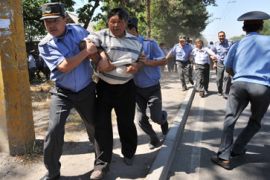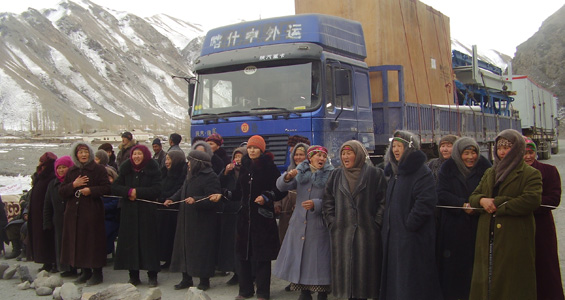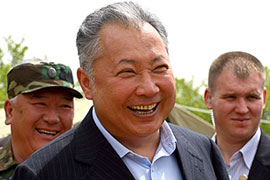Activists brave danger in Bishkek
Rights organisations say the press and opposition are being repressed in Kyrgyzstan.

 |
| Protesters in Kyrgzstan block a road as they demand the release of political detainees [RFE/RL] |
In an over-heated office space near the centre of Bishkek, the capital of Kyrgyzstan, three young women languish on a worn sofa, as they complete their first day on hunger strike.
Their revolutionary headbands bear the slogan: “Free political prisoners and end the Bakiyev clan tyranny.”
Since mid-January, they and other activists have been taking part in a rotating hunger strike for a few days each at a time, to protest against the jailing of a former defence minister-turned dissident, General Ismail Isakov.
The popular general was stripped of his rank and sentenced to eight years in prison for corruption. But his supporters say his incarceration was politically motivated, and just the latest in a string of criminal investigations, jail sentences and smear campaigns against opposition leaders.
In another demonstration calling for his release, protesters blocked a trucking route from China but this was swiftly dismantled by police.
Topchubek Turgunaliyev, the organiser of the hunger strike, says more protests are planned.
“We have overcome our fears, and we plan more actions if necessary. Some people are even threatening to set themselves on fire. But we have so far succeeded in stopping them,” he told Al Jazeera.
Defiance
No one has yet been prepared to make the ultimate sacrifice. Rather, these demonstrations appear to be slow-burning acts of defiance toward a government highly effective at stifling dissent and seemingly impervious to criticism.
Omurbek Tekebayev heads the Ata Meken (Fatherland) Party. He joined an opposition coalition which fought and lost a presidential election against the incumbent Kurmanbek Bakiyev in July 2009. Credible election monitors like the Organisation for Security and Cooperation in Europe alleged widespread fraud. But since then, Tekebayev admits, the opposition has weakened.
“It is true, we are fractured, and we lack unity. The opposition cannot operate effectively in this climate of fear. Based on this fear the business sector and others cannot state their political positions. Opposition parties get no financial support, no media coverage.”
Privately, international observers and analysts believe the 2009 election has emboldened Kurmanbek Bakiyev, the president, to consolidate his authority, and that a spate of assaults and intimidations towards its critics are no coincidence.
In 2009, these included a number of attacks on journalists in Kyrgyzstan, from beatings to threatening letters containing bullets. But the country’s interior minister has publicly stated that in most cases the incidents were not related to the victims’ work.
Menacing calls
 |
| Activists say the elections have emoboldened Bakiyev to consolidate his authority [EPA] |
In the offices of Forum newspaper, Jyldyz Musabekova sits calmly at her desk and recounts her own experience. Two stony-faced police inspectors are taking notes.
The deputy editor has reported being followed in her car, and receiving menacing anonymous phone calls. After reports about her ordeal surfaced in the media, she received another call.
She said that the anonymous caller told her to begin worrying about her daughter.
“We have taken her out of school. But it hasn’t stopped me writing. We discuss problems openly. We wrote about the imprisonment of General Ismael Isakov and the murder of Gennady Pavlyuk. It’s our job to report on these issues, because the government media do not.”
Pavlyuk’s death stunned the media community. On December 16, 2009 the Kyrgyz journalist was thrown from the sixth floor of an apartment block in Almaty in neighbouring Kazakhstan. His hands and feet had been bound. He died from his injuries a few days later.
Tekebayev says Pavlyuk had been collaborating with his party on a media project, and was well connected in Russian political circles. He believes Pavlyuk, who had been critical of the Bakiyev administration, was lured to Almaty by Kyrgyz intelligence agents.
“They thought he could find support from abroad and use it against the government. Maybe they overestimated his plans but they did not want to risk anything.”
Kazakhstan’s police say they have identified Kyrgyz suspects and the Kyrgyz government is said to be co-operating with the investigation.
Al Jazeera has tried on a number of occasions to contact the Kyrgyz authorities, but to date no official has been available for comment.
Tulip Revolution
Kurmanbek Bakiyev came to power after the relatively bloodless Tulip ‘colour’ Revolution in 2005 removed his unpopular predecessor, Askar Akayev, who had led the country since independence from the Soviet Union in 1991.
His embrace of economic reforms and his liberal rhetoric gave his country a reputation for being an ‘island of democracy’ in the region.
But Akayev failed to live up to his promises, succumbing to corruption and abuses of power in his efforts to hold on to his authority. The country’s various political factions transported their supporters into Bishkek after chaotic elections in March 2005 revealed Akayev’s weak grip on power. He fled to Moscow.
Bakiyev won an overwhelming vote later that year but the demonstrations continued as many held the notion that the revolution had failed to bring any real change.
Over the next few years, his rule oversaw changes to the constitution that strengthened his executive powers, while international monitors concluded that subsequent national polls were falsified, especially parliamentary elections in 2007 that decimated the opposition.
In many ways, the present political situation in Kyrgyzstan has changed little in recent months. An atmosphere of fear and suspicion has been in place since before last year’s presidential election due in part to incidents such as the brutal assault of the investigative journalist Syrgak Abdyldaev in March 2009. His injuries involved broken limbs and multiple stab wounds to his buttocks. He has since left the country.
Later that month the former head of the presidential administration, Medet Sadyrkulov, died in a suspicious road accident. Sources claimed he feared for his life. Opposition leaders described it as an assassination.
Succession
Medet Tiulegenov, a professor in political theory at the Bishkek-based American University of Central Asia, believes the most serious development in recent months is that Bakiyev appears to be openly preparing his son Maxim for a family succession.
Maxim Bakiyev now heads the country’s newest and most powerful agency which has virtual control of the economy; the president is also rushing through amendments that will give him the power to appoint his own successor.
“Can the president really appoint as his immediate [successor] his own son? This act, this sense of impunity is a departure from what we have seen before,” Tiulegenov asks.
For now, Bakiyev’s administration continues to govern unperturbed by outside criticism. The US-based rights watchdog Freedom House downgraded Kyrgyzstan to ‘not free’ in January. But in the Kyrgyz halls of power, the cabinet is assured that any Western objections lack teeth as long as Nato and the US continue to depend on their rented airbase outside the Kyrgyz capital.
The so-called Manas Transit Center is critical to operations in Afghanistan as a troop supply and refuelling hub.
Painful reforms expected
Most analysts believe that for now, the president’s position is unassailable, provided the country’s weak economy holds together. Some have warned that painful reforms in the energy sector might bring disgruntled citizens onto the streets; however, after utility bills recently doubled, no such demonstrations have materialised.
There have been some moderate improvements in living standards since the difficult transition years that followed independence in the 1990s. Poverty levels have since fallen. According to the country’s National Statistics Committee, in 1998 almost the entire rural population was classified as poor or very poor. That figure had halved by 2007.
But many Kyrgyz families still depend on remittances sent by family members working abroad. These took a hit when overseas labour demands plummeted in the global recession.
Paradoxically Kyrgyzstan has enjoyed a level of political pluralism and civic activism superior to its neighbours – at least until now. Kyrgyzstan is the only country in Central Asia to have experienced a relatively peaceful transition of power after the mass demonstrations of 2005 and just over one fifth of its parliament is comprised of opposition deputies.
Tiulegenov offers his own barometer for measuring his country’s political climate. In his analysis, despite the state’s increasing willingness to clamp down on dissent by any means, Kyrgyz democracy is a reflection of the extent to which ordinary people are still prepared to speak their minds, either among friends, or in public.
“If you are still able to speak, despite fearing the consequences, the system retains a degree of democracy. Once people stop speaking out at all, well then we have moved on to another dimension.”
The year 2009 saw some of those who were prepared to speak out, fall silent. That new dimension may already have been reached.